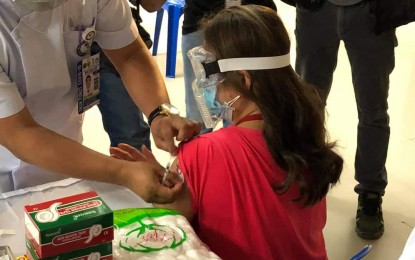
(PNA file photo)
MANILA – Health experts on Wednesday clarified that getting a vaccine passport after having been inoculated is not a guarantee that an individual will not spread or get infected with the coronavirus disease 2019 (Covid-19) anymore.
In a Laging Handa briefing on Wednesday, Dr. Anna Ong-Lim, a member of the Department of Health’s (DOH) Technical Advisory Group, said vaccine passports will merely serve as a record that an individual has been vaccinated.
“Hindi 'yung kapag nakapagbigay proof ka na nabakunahan ka na eh hindi ka na manghahawa at hindi ka (na) mahahawaan. And in fact, wala pa tayo ganun klaseng information (It won’t be because you already have proof that you’re vaccinated that you cannot infect or get infected. In fact, we don’t have that kind of information yet),” Lim said.
She noted that vaccinated individuals are expected to benefit from a decrease in the severity of Covid-19 symptoms and that there is no information yet on whether vaccination will decrease transmission of the disease.
“Kahit na nabakunahan na, ang mga healthcare workers pinag-iingat pa rin ang lahat kasi yun ngang paglipat ng sakit, whether mahawaan or manghawa, ay hindi kasama dun sa datos na hawak natin sa ngayon (Even after inoculation, our health workers are still being cautioned because the transmission of the disease is not included in the data that we have right now),” Lim said.
Dr. John Wong, a member of the Inter-Agency Task Force for the Management of Emerging Infections Diseases–Technical Working Group on Data Analytics, said vaccine passports will be required mostly by businesses such as airline companies before allowing people inside their establishments.
However, he said, “it will take a while before the Philippines reaches that stage, where we'll be able to say somebody with a vaccination passport will not be able to transmit, that it will be safe.”
The spread of new variants
Meanwhile, Wong said the Philippine Genome Center has detected “several cases” of both the UK and South Africa variant of the virus that causes Covid-19, noting that the UK-variant was known to have increased transmissibility while the South Africa-variant is supposed to be resistant against vaccines.
He said the current surge of new cases of Covid-19 in the country may be caused by the UK-variant.
If over half of all cases in the National Capital Region (NCR) gets infected with the UK-variant, he said there may be an increase of “nine times more cases after a month.”
“So, we have to take precautions to avoid this,” Wong said.
On Tuesday, the DOH reported 2,668 new infections of Covid-19, with active cases totaling 41,822 or 7 percent of all infections since the pandemic hit the country back in 2020. (PNA)
